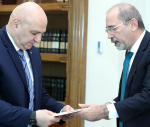You are here
South Sudan battles rage as violence enters second month
By AFP - Jan 15,2014 - Last updated at Jan 15,2014
JUBA — South Sudan’s military battled rebels in the streets of the key northern oil town of Malakal on Wednesday, the army said, as violence in the world’s newest nation entered its second month.
Little progress has so far been made in ceasefire talks in neighbouring Ethiopia, where leaders have spent time squabbling over the venue but are deadlocked over rebel demands for the release of political prisoners.
The battle for Malakal, the main town in Upper Nile state, is now turning into one of the most bitter in the conflict, with the United Nations reporting tank battles in the streets.
Some of the 20,000 civilians sheltering in the peacekeepers’ compound were wounded by stray bullets from heavy machine guns during the intense battle, with the peacekeeping mission saying it was treating “dozens of patients”.
“There is heavy fighting,” army spokesman Philip Aguer told AFP, dismissing rebel claims that they had taken control of the town.
Rebel forces staged a fresh attack Tuesday to seize Malakal, which has already changed hands twice since the conflict began, with rebel spokesman Lul Ruai Kong boasting that the insurgents had recaptured the town.
“This is not over yet,” Aguer said, saying the rebels were liars. “The fighting is ongoing.”
South Sudan has been gripped by violence since December 15, when clashes broke out between army units loyal to South Sudanese President Salva Kiir and those supporting ex-vice president Riek Machar.
According to the United Nations, about 400,000 civilians have fled their homes over the past month as the violence spiralled into ethnic killings between members of Kiir’s Dinka people — the country’s largest group — and Machar’s Nuer community.
Up to 10,000 people are believed to have been killed in the fighting, aid sources and analysts say, including more than 200 civilians who drowned in a boat fleeing the latest round of fighting in Malakal.
Aid agencies looted
UN leader Ban Ki-moon on Tuesday condemned both the army and rebels for stealing food and humanitarian supplies, expressing alarm at the “rising number of fatalities” in the fighting.
The UN World Food Programme has said that at least 10 per cent of its food in the stores have been looted, enough to feed some 180,000 people for a month.
More than four million people, or roughly a third of the population of the country that won independence from Sudan only in 2011, were deemed to be “food insecure” by WFP even before fighting began.
The East African regional bloc IGAD has been brokering peace talks in neighbouring Ethiopia, although with still little sign of a ceasefire agreement.
Kiir, in a statement released Wednesday, called on the country to stand together at “this dark moment” while vowing to “defeat the rebels forever”.
Late Tuesday, Information Minister Michael Makuei voiced optimism that the two sides may soon “agree on the cessation of hostilities”, but the rebel delegation said the key sticking point was still the release of political leaders arrested in Juba.
An eventual ceasefire and prisoner release are “hooked together”, rebel delegate Hussein Mar Nyout told AFP.
China’s ambassador to the African Union Xie Xiaoyan repeated Beijing’s demands for an end to the fighting.
“Only through dialogue and negotiation can we ever hope to settle the dispute and help the country get back to normal,” he told reporters in Addis Ababa on Wednesday.
Beijing has invested heavily in the country’s oil sector and buys most of its crude output.
The army is also trying to recapture the town of Bor, the capital of restive Jonglei state, from the rebels. Aguer, in a statement he has repeated for more than a week, said the army was “still marching on Bor”.
More than 70,000 civilians are sheltering in UN peacekeeper bases, with UN forces searching camps on Wednesday for weapons and military uniforms.
Regional nations have also been dragged in, with former civil war foes Sudan offering support to secure oil fields, and neighbour Uganda sending in troops to back Kiir.
Uganda’s parliament on Tuesday endorsed the decision to send in troops, with Defence Minister Crispus Kiyonga claiming that the soldiers had helped avert “genocide”.
Related Articles
At least 200 South Sudanese civilians have drowned in a ferry accident on the White Nile river while fleeing fresh fighting in the city of Malakal, an army spokesman said Tuesday.
South Sudanese government forces backed by Ugandan troops on Saturday recaptured the strategic town of Bor, defeating an army of thousands of rebels, officials said.
Government forces and rebels fought fresh battles across South Sudan on Sunday, vowing to step up their offensives as regional peace brokers struggled to get ceasefire talks off the ground.














